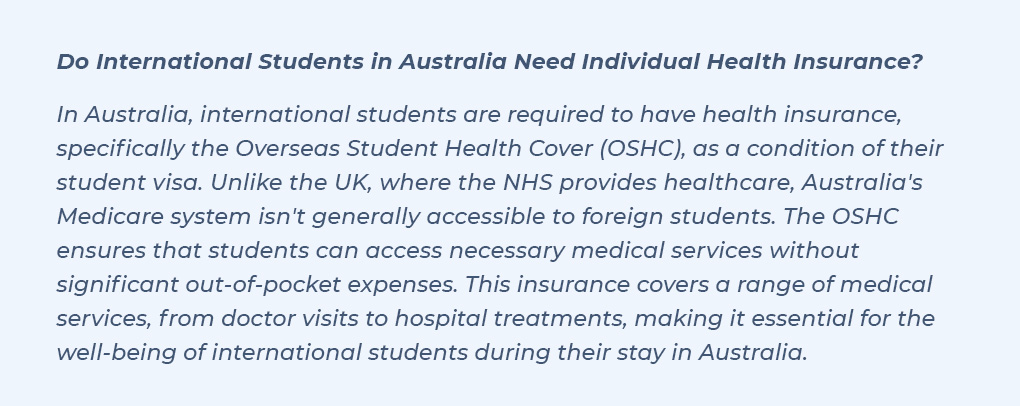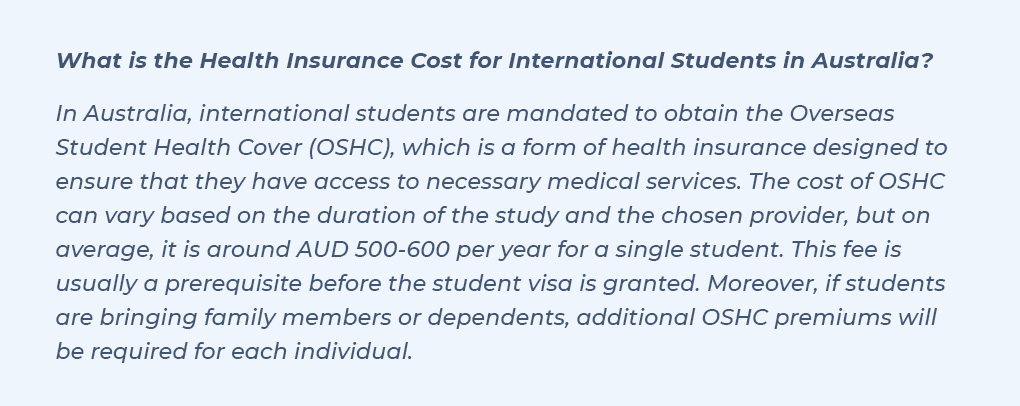

Australia is not just famous for its iconic Sydney Opera House, the Great Barrier Reef, and its unique wildlife; it is also recognized globally for its superior educational institutions and its commitment to offering excellent healthcare facilities. When it comes to international students, understanding the healthcare system can be a bit overwhelming, especially if it’s a significant departure from the system in their home country.
This article will take you through the ins and outs of medical and healthcare facilities available for international students in Australia.
In this blog we will cover the following 14 topics:
The Australian healthcare system is a mix of public and private services. It is world-class, ensuring that all residents, including international students, have access to quality medical services. The primary mechanism for this is the Australian Government’s Medicare system.
Medicare provides access to a range of medical services, lower-cost prescriptions, and free treatment in public hospitals. It’s funded through a mix of general revenue and the Medicare Levy – a tax taken from the income of Australian residents.
However, it's essential to understand that as an international student, you may not have immediate access to Medicare. Instead, the Australian government requires you to have Overseas Student Health Cover (OSHC) for the duration of your student visa.
Overseas Student Health Cover (OSHC) is an initiative designed to support international students in Australia. Recognizing that medical care can be expensive, especially in a foreign country, the Australian government mandates that international students hold an active OSHC policy for the duration of their stay.
This insurance helps students offset the potentially high costs of medical and hospital treatments, ensuring that they can access the necessary healthcare services without significant financial strain.
Australia, while known for its high-quality healthcare, can also have high medical costs for those not covered under its national Medicare system. As international students typically don't qualify for Medicare, OSHC acts as a safety net, allowing students to access a range of medical services without incurring hefty bills.
There are multiple OSHC providers in Australia, and the market is competitive. Providers offer different packages at various price points. Some of the well-known providers include Bupa, Allianz, Medibank, and nib. It's recommended that students compare plans, looking at coverage limits, waiting periods, and any additional benefits before settling on a policy.

I. General Practitioners (GP): When feeling under the weather, a General Practitioner (or GP) is your go-to medical professional. They handle a broad range of health issues, from common colds to chronic conditions. With OSHC, consultation fees for visiting a GP are covered, ensuring that students can seek medical advice whenever they need it without worrying about costs.
II. Specialists: There are moments when a more specialized approach to healthcare is necessary. If a GP believes that a patient requires specialized treatment or assessment, they'll refer them to a specialist. Whether it's a dermatologist for skin issues, a cardiologist for heart concerns, or an orthopaedic for bone and joint problems, OSHC helps in absorbing the often higher fees associated with specialist visits.
III. Hospital Treatment: Hospital stays, surgeries, and treatments can be expensive. With OSHC, students are protected from these high costs. The insurance covers treatments in both public and private hospitals. This coverage extends to accommodation, surgical procedures, intensive care, and medicines available in the hospital.
IV. Emergency Ambulance Services: Medical emergencies can be unpredictable. In situations where immediate medical care is required, and a student needs to be transported via ambulance, OSHC will cover the costs associated with this service.
V. Prescription Medications: After seeing a doctor, there might be a need for prescription medications. OSHC typically covers a portion of the cost for these medicines, ensuring that students can afford the essential drugs they need for recovery or managing conditions.
Even with the robust healthcare provisions of Australia's Medicare system and the additional support from OSHC for international students, not every service is fully covered.
Services such as elective treatments that are not medically necessary, specific dental procedures, certain optometry tests, some physiotherapy services, travel vaccinations, and cosmetic surgeries often aren't included within the basic coverage.
They may either be not covered at all or might necessitate additional out-of-pocket expenses. Always check with your healthcare provider or insurance to understand what's covered and what's not.

In addition to OSHC, some students opt for private health insurance. This can cover services not included in OSHC, like dental, physiotherapy, and optometry. It also can allow for faster access to elective treatments in private hospitals.
Most universities in Australia have a health service centre on campus, providing easily accessible medical services for students. These centres often offer discounted rates for students, making it convenient and affordable to seek medical care when needed.
Studying abroad can be an overwhelming experience. The stress of adapting to a new culture, academic pressures, and homesickness can take a toll on one’s mental health. Recognizing this, many Australian institutions offer counselling and mental health services to support international students. These services are confidential and are either free or provided at a low cost.
Dental care isn't typically covered under OSHC unless you have an extended cover. However, Australia boasts an array of private dental clinics. It's advisable to get supplementary dental insurance if you anticipate needing dental treatments.
Pharmacies, locally referred to as chemists in Australia, are widely available. They offer both over-the-counter and prescription medicines. Remember that while OSHC covers part of the cost of prescription medicines, there’s usually a set limit per year.
In case of emergencies, the number to dial in Australia is 000. It connects callers to ambulance, fire, or police services. Hospitals in Australia are equipped with Emergency Departments for urgent medical attention, and with OSHC, the costs associated with emergency treatments are generally covered.
Australia emphasizes preventative health. Free or subsidized health checks, vaccinations, and screenings are commonly offered. For international students hailing from countries with diverse health backgrounds, it's advisable to keep up-to-date with these preventative measures.

For those opting for offline or paper-based visa applications, it's recommended to pay for the OSHC online before sending in the application. During this process, specific details such as the visa subclass, personal email address, and passport information may be required to complete the transaction.
1. Understand the Healthcare System: Before anything else, familiarize yourself with Australia's healthcare system. Secure an Overseas Student Health Cover (OSHC) which provides access to numerous medical services at reduced costs.
2. Stay Hydrated: Australia's climate, especially during summer, can be quite hot. Always carry a water bottle, and ensure you're drinking enough throughout the day.
3. Maintain a Balanced Diet: Australia boasts an array of fresh produce. Visit local markets and supermarkets to buy nutritious ingredients. Incorporate a mix of fruits, vegetables, proteins, and grains into your meals.
4. Use Sun Protection: The Australian sun can be strong. Always use sunscreen, wear a hat, and use sunglasses when outside to protect yourself from harmful UV rays.
5. Regular Exercise: Utilize campus sports facilities, join fitness clubs, or simply take walks around your campus or the city. Many Australian cities have beautiful parks and beaches that are perfect for outdoor activities.
6. Limit Alcohol Consumption: While socializing and exploring the nightlife can be part of the student experience, moderation is crucial. Drink responsibly and be aware of the legal drinking age (18 in Australia).
7. Stay Connected: Homesickness can be a challenge. Stay connected with family and friends back home. Also, engage in social groups or clubs in your university to make new friends and build a support system.
8. Prioritize Mental Health: Many universities offer counseling services. If you ever feel overwhelmed, anxious, or depressed, don't hesitate to seek help. Talking about your feelings can make a significant difference.
9. Get Adequate Sleep: With assignments, exams, and socializing, it's easy to compromise on sleep. However, aim for 7-9 hours of sleep to ensure you're refreshed and ready for the day.
10. Practice Good Hygiene: Regular hand-washing, especially in shared living spaces, can prevent the spread of germs. With the recent global health events, it's even more crucial to practice good personal hygiene.
Australia’s robust healthcare system ensures that international students have access to high-quality medical services. While the system may differ from what many students are used to, it's designed to be comprehensive and supportive. By understanding the facilities available and ensuring they have the appropriate health cover, international students can make the most of their time Down Under, safe in the knowledge that their health is in good hands.

Studying abroad is an exciting and life-changing experience that offers students a chance to gain a global perspective and valuable exposure ...

In our rapidly globalizing world, where boundaries are melting away and opportunities abound, proficiency in the English language has become ...

Choosing to pursue higher education abroad is an exciting and life-changing decision. Among the plethora of options available to internationa...

Studying abroad is a life-altering adventure that opens doors to new cultures, experiences, and opportunities. Among the plethora of global s...

Australia, renowned for its world-class education and diverse cultural experiences, continues to be a favoured destination for international ...

Studying abroad is a life-changing decision, and with so many options available, it can be overwhelming to choose the right country and univers...

As of March 2022, Australia has seen a consistent rise in its international student numbers, with enrolments reaching 440,219. This marks an ...

In the coming, international students continue to be drawn to the United Kingdom for its world-class education and diverse cultural experiences...